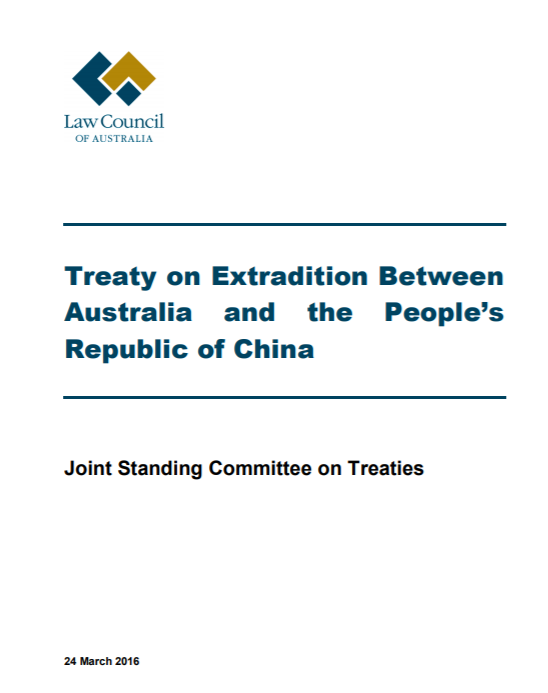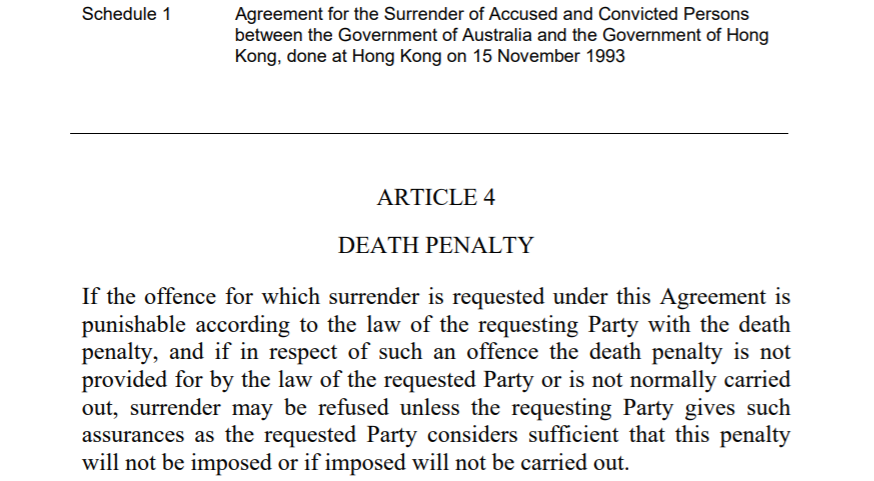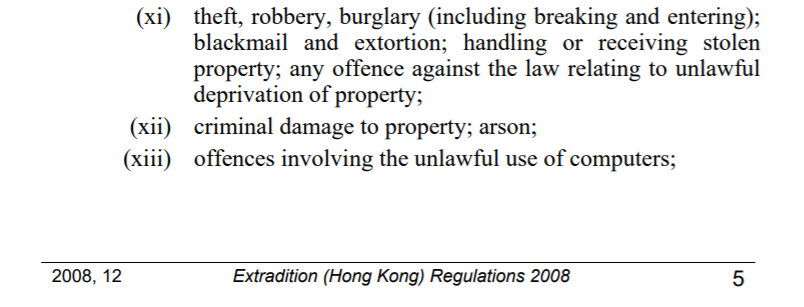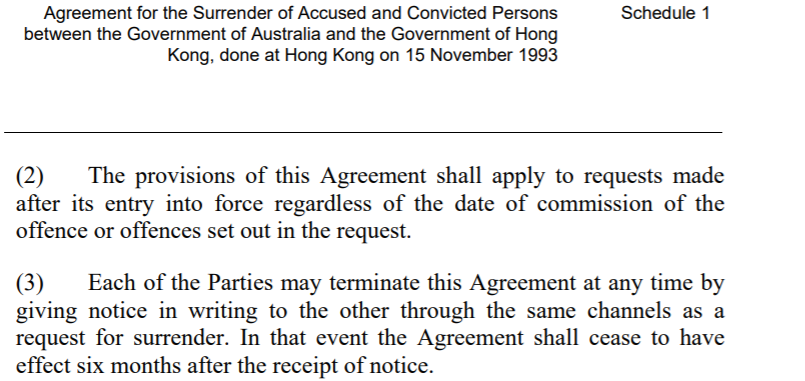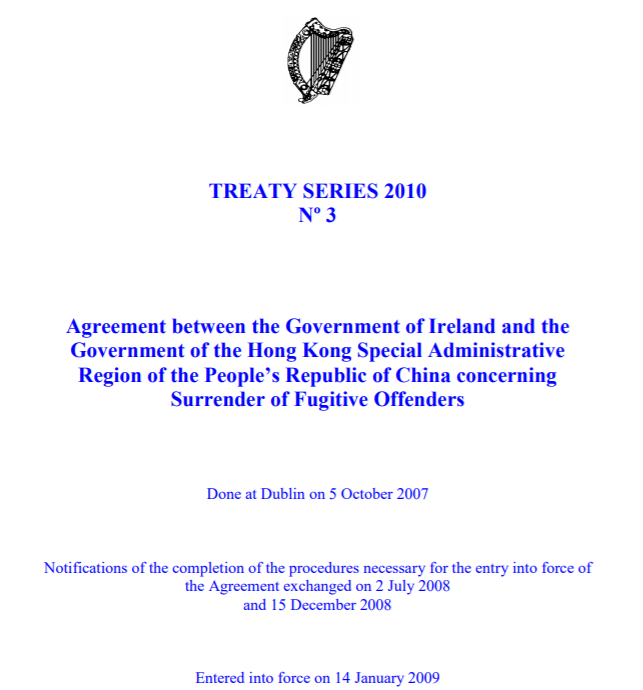1. With the passage of the #NationalSecurityLaw in #HongKong, #Australia should immediately terminate the Australia-Hong Kong Extradition Agreement.
Below is a thread on why & some of the problems, highlighting just 6.
Below is a thread on why & some of the problems, highlighting just 6.
2. I prepared some of this as background 1 week ago, but it wasn’t used. Anyone in Australia should be worried.
For context, I have done advocacy against the Australia-China Extradition Agreement @lawcouncil & Hong Kong Extradition proposals @justicecentrehk.
For context, I have done advocacy against the Australia-China Extradition Agreement @lawcouncil & Hong Kong Extradition proposals @justicecentrehk.
3. Problem 1: An Australian found to have violated the #NationalSecurityLaw could be extradited to #HongKong.
This exposes any Australian resident to significant penalties, including up to life imprisonment for “serious crimes”. The offences are deliberately ambiguously worded.
This exposes any Australian resident to significant penalties, including up to life imprisonment for “serious crimes”. The offences are deliberately ambiguously worded.
4. Problem 2: Once extradited to #HongKong the person could end up in #China.
The #NationalSecurityLaw allows mainland laws to be used for the most serious cases. This is what the debate in 2016-2017 was about against ratification of the Australia-China Extradition Treaty.
The #NationalSecurityLaw allows mainland laws to be used for the most serious cases. This is what the debate in 2016-2017 was about against ratification of the Australia-China Extradition Treaty.
5. Although unlikely, it could lead to Australians being subjected to the death penalty. Assurances the #HongKong gov gives via #NSL, including Art 4 is worthless, given recent comments.
Given Australia’s opposition to the death penalty internationally, this is alarming.
Given Australia’s opposition to the death penalty internationally, this is alarming.
6. But first there needs to be like-for-like crimes in each jurisdiction to permit extradition?
That is right & there are, eg Art 2(1)(xii) of the Agreement “criminal damage to property”. Art 24(3) of #NSL "destruction of vehicles, transportation facilities, power equipment".
That is right & there are, eg Art 2(1)(xii) of the Agreement “criminal damage to property”. Art 24(3) of #NSL "destruction of vehicles, transportation facilities, power equipment".
7. Problem 3: Grounds for refusal in the Agreement are insufficient.
Refusal can be granted under Art 6(1) if the offence is of a “political character”, the person is persecuted on certain grounds or they might be punished by race, religion, nationality or political opinions.
Refusal can be granted under Art 6(1) if the offence is of a “political character”, the person is persecuted on certain grounds or they might be punished by race, religion, nationality or political opinions.
8. However, there are insufficient grounds to refuse an extradition if it is unjust or oppressive (cf Indonesia), or if the person is unlikely to receive a fair trial.
The risk of either is high, eg trials will be held in secret & judges will be selected by the Chief Executive.
The risk of either is high, eg trials will be held in secret & judges will be selected by the Chief Executive.
9. Problem 4: The Agreement adheres to the flawed ‘no evidence’ rule.
Extradition documents don’t include a brief of evidence of the offence. In 2008, the Agreement was amended from a & #39;prima facie& #39; standard, which required evidence that would justify committal for trial.
Extradition documents don’t include a brief of evidence of the offence. In 2008, the Agreement was amended from a & #39;prima facie& #39; standard, which required evidence that would justify committal for trial.
10. The & #39;no evidence& #39; rule has long been criticised. In 2001, the Joint Standing Committee on Treaties said “we do not favour the continuation of the default ‘no evidence’ model”.
This came up in the Australia-China Extradition Treaty debate, with many criticising its use.
This came up in the Australia-China Extradition Treaty debate, with many criticising its use.
11. There are some limited exceptions where a ‘no evidence’ model might be appropriate.
That might be in cases where the other party is a democracy & the #ruleoflaw can be guaranteed. #HongKong, unfortunately, is not in that category.
That might be in cases where the other party is a democracy & the #ruleoflaw can be guaranteed. #HongKong, unfortunately, is not in that category.
12. Problem 5: It is impossible for Australia to be confident with any investigatory procedures under the #NationalSecurityLaw.
New security forces will answer to Beijing. The national security office stationed with Chinese officers will handle cases according to Chinese law.
New security forces will answer to Beijing. The national security office stationed with Chinese officers will handle cases according to Chinese law.
13. Hong Kong police themselves have extraordinary powers, including to searches without a court warrant. All overseen by the Chief Executive & can& #39;t be challenged.
This is aside from the many cases of excessive force by police. Plus the lack of an independent complaints body.
This is aside from the many cases of excessive force by police. Plus the lack of an independent complaints body.
14. Problem 6: Mandatory minimum sentences under the #NationalSecurityLaw.
Regular cases attract mandatory 3yrs in prison. Mandatory sentencing is arbitrary & limits a right to a fair trial by preventing judges from imposing an appropriate penalty based on the circumstances.
Regular cases attract mandatory 3yrs in prison. Mandatory sentencing is arbitrary & limits a right to a fair trial by preventing judges from imposing an appropriate penalty based on the circumstances.
15. The use of mandatory minimum sentences for such broad offences is deeply problematic.
Extradition alone in those circumstances, could potentially breach #Australia’s obligations under Art 14 of ICCPR (right to a fair trial). See also Kindler v Canada (470/91).
Extradition alone in those circumstances, could potentially breach #Australia’s obligations under Art 14 of ICCPR (right to a fair trial). See also Kindler v Canada (470/91).
16. I could go on. All the above, some may ask, if there is a travel ban due to COVID-19, why the rush?
Under Art 21(3) of the Agreement either party may terminate the agreement by giving notice, but the Agreement only ceases to have effect 6 months after receipt of notice.
Under Art 21(3) of the Agreement either party may terminate the agreement by giving notice, but the Agreement only ceases to have effect 6 months after receipt of notice.
17. No doubt the above issues are being considered by @agdgovau now, but #Australia needs to gives effect to Art 21(3) as soon as possible.
Australia should follow #Canada’s lead and urge all other states that have extradition arrangements with #HongKong to terminate them.
Australia should follow #Canada’s lead and urge all other states that have extradition arrangements with #HongKong to terminate them.
18. The above problems should be of concern to all states that have extradition treaties with Hong Kong. Many of them are drafted in a very similar way, whether it is Canada, UK, India, Ireland or others.
19. Finally, termination wouldn’t “interfere in internal affairs”, regardless what Beijing says.
It is up to the Australian gov. Doing so is in Australia’s national interest, ensures safety of Australian residents & reduces risks of breaching our #humanrights obligations.
It is up to the Australian gov. Doing so is in Australia’s national interest, ensures safety of Australian residents & reduces risks of breaching our #humanrights obligations.
20. May be of interest to @ipacglobal @hk_watch @DrIanHall @stephendziedzic @billbirtles @Johnny_HKWatch @benedictrogers @MikeSmithAFR @John_F_Power @tomgrundy @alvinllum @ClaudiaMCMo @ray_slowbeat
Good to see some traction on this happening today. https://www.abc.net.au/news/2020-07-08/australia-may-end-extradition-with-hong-kong/12429648">https://www.abc.net.au/news/2020...
Good to see some traction on this happening today. https://www.abc.net.au/news/2020-07-08/australia-may-end-extradition-with-hong-kong/12429648">https://www.abc.net.au/news/2020...

 Read on Twitter
Read on Twitter